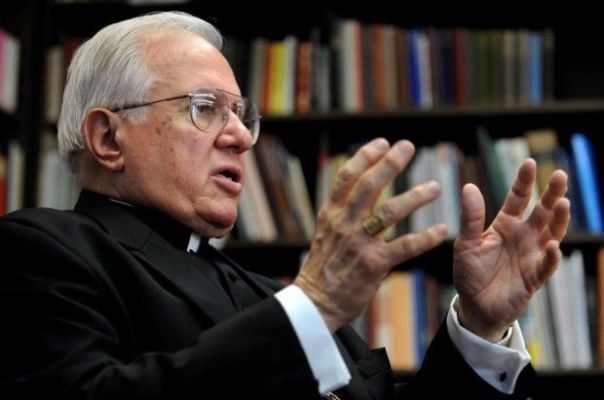Blog Archives
Remembering When Lincoln Responded to Dissent with Excommunication
With one national party’s convention complete, and another about to commence, the U.S. presidential race is hitting full stride. However, with this current political season comes yet another all too common occurrence: a dissenting Catholic assuming a prominent role on one of the national tickets.
Following Hillary Clinton’s choice of Senator Tim Kaine (D-VA) for Vice President, we have this year’s version of Joe Biden, a professing Catholic politician who stands in direct opposition to many of the Church’s most fundamental moral teachings on Life and Family.
Hailing from the historically liberal Diocese of Richmond, VA, from a parish which prides itself on preaching Cardinal Bernardin’s “seamless garment”, and having been Jesuit educated throughout his formative years, Senator Kaine repeatedly supports issues incompatible with his Catholic faith. From abortion to same sex marriage, the senator continues to cause public scandal through his ongoing political support of intrinsic evil.
In this scenario involving a professing Catholic who holds such views, we will most likely see one of three possible responses from our bishops:
1. Some will remain silent, avoiding the conversation entirely, and thereby providing no direction to their flock.
2. Others will vocally call out Senator Kaine on his support for abortion and same sex marriage, even admonishing him to refrain from receiving Communion, but will publicly say nothing to Bishop Francis DiLorenzo of Richmond about his most (in)famous spiritual son.
3. Finally, there will be the wolves in shepherd’s clothing who will seek to cloud the issue by infusing moral relativism into the discussion. Watch as liberal prelates and notable Jesuits only reference Kaine’s unacceptable positions on abortion and marriage by dragging in acceptable policy differences on other issues such as immigration reform or gun control.
But it needn’t be this way. Open dissent from Catholic teaching and beliefs, the kind of public scandal which leads souls astray, can be addressed. In fact, it must be addressed.
It has been twenty years since the Diocese of Lincoln, Nebraska, lead at the time by Bishop Fabian W. Bruskewitz, excommunicated members of various organizations deemed as incompatible with the teachings of the Catholic Church.
While this was big news at the time, there are many today not familiar with the story. Even more important, the Lincoln episode points to the fact that a bishop has the absolute authority, and indeed the obligation, to utilize this most severe of penalties for the purpose of saving souls.
As I have written about before, the Lincoln diocese has been a beacon of orthodoxy for decades:
Against all odds and the prevailing winds of the post-conciliar Church, Lincoln has avoided the craziness and irreverence that has afflicted so many other dioceses. This has largely been achieved through the stability and orthodoxy provided over the last fifty years by three men: Bishop Glennon Flavin (1967-1992), Bishop Fabian Bruskewitz (1992-2012), and Bishop James Conley (2012-present). They succeeded despite the occasional scorn of their brother bishops, and by making the Church’s perennial priorities their own.
In 1996 the group Call to Action, a Catholic organization known for its dissenting views about priestly celibacy and female ordination, announced it was forming a chapter in Lincoln. The group itself was based out of Chicago and claimed 15,000 members, including several thousand priests and nuns, and even several American bishops.
Bishop Bruskewitz wasted little time in addressing this open dissent, and the impending confusion and scandal sure to follow. He used the formation of the Call to Action chapter as his opportunity to address other disobedient Catholic within his diocese.
In an open letter dated March 18, 1996, Bishop Bruskewitz identified other groups whose members faced excommunication:
Planned Parenthood;
Catholics for a Free Choice;
The Hemlock Society, a national group promoting euthanasia legislation in Nebraska at the time;
The Freemasons and their affiliates DeMolay, Eastern Star, Job’s Daughters and Rainbow Girls, all Masonic organizations;
and members of the local Society of St. Pius X chapel.
As reported by the Washington Post:
“Bruskewitz’s warning about excommunication…applies only to Catholics in his diocese. The bishop felt the move necessary because parishioners had made inquiries to the diocese about these groups, and participation in any of them could “endanger the salvation of one’s soul,” said Monsignor Timothy Thorburn, chancellor of the Lincoln diocese.”
The penalty of excommunication is both a last resort and a merciful act by Holy Mother Church. As further noted by Monsignor Thorburn at the time, excommunication is “medicinal” and “meant to call the person back to the faith.” While the individual can no longer avail themselves to the sacraments of the Church, the ultimate goal is for reconciliation with the local ordinary and the lifting of the sentence.
It is interesting to note that, twenty years later, the Lincoln excommunications remain in place. A 2006 letter from Rome reaffirmed that Bishop Bruskewitz had indeed acted fully within his authority and with the proper concern for his flock.
While no one doubts that some members of those groups identified may have continued to receive the sacraments over the years, the public nature of their excommunication served to address the very public scandal and dissent caused by these groups. At least in the Diocese of Lincoln.
Looking at this current election cycle, one wonders what might happen if more of our shepherds sought to protect the faithful from such open disobedience.
Would dissenting Catholics who falsely portray themselves as devout be unable to if their own political positions and public scandal resulted in excommunication?
Sadly, we will never know, as few bishops today appear to have the resolve demonstrated by Bishop Bruskewitz back then. And because of their refusal to impose the ultimate of ecclesial penalties, Catholicism will continue to be largely defined for many of the faithful by the public scandal of dissenting politicians.


